- Home
- Sherman Alexie
The Lone Ranger and Tonto Fistfight in Heaven Page 19
The Lone Ranger and Tonto Fistfight in Heaven Read online
Page 19
“Joseph, your face. What happened?”
John-John moved closer to his brother, reached out and touched the scars, the skin. Hot and cold. Both close to tears.
“Sir, it’s been a long and glorious war but I am happy to be home, sir.”
“But your face. What did they do to you?”
“Sir, I am proud to say I withstood their tortures with courage and strength. I only gave them my name, rank, and serial number, sir.”
John-John cried then, took his brother’s hand. Swollen and scratched, Joseph’s hand felt like fear and failure. He had lost his left ring finger, his nails were torn, some missing altogether. Crude initials were carved into his palms.
“Joseph, don’t you recognize me? It’s your brother John-John.”
Joseph stared at his brother intently, searched his memory. He saw those eyes curved like a bow, colored like the center of the earth; that hair short and still untamed, black; that mouth, too small for the face; those teeth yellowed and healthy; those hands, that hand now holding his, so long and forgiving, skin like a woman’s.
Who are you? Who are you?
“Sir, I don’t remember. I’m sorry. I just don’t remember, sir.”
Memory, like a coin trick, like the French drop with one hand passing over the other, quarter dropping out of sight, then out of existence. It was there! It was there! The little Indian boys screaming at the sudden recognition of their first metaphor. Memory like an abandoned car, rusting and forgotten though it sits in plain view for decades. Dogs have litters there; generations of spiders live a terrible history. All of it goes unnoticed and no one bothers to tell the story.
This is not the story John-John tells himself just before he falls asleep. In his story, Joseph comes back on a bus, on a train, hitchhiking. In his story, Joseph’s feet never leave the ground again. But that kind of vision is costly; it rips sweat from John-John’s sleep and skin. He wakes up with a thirst that is so large that nothing can be forgiven. He wakes up with the sound of Joseph’s voice in his nose. Reverberation.
“Hey, John-John, why do you got two first names?”
“’Cuz you have to say anything twice to make it true?”
“No, that ain’t it.”
“’Cuz our parents really meant it when they named me?”
“I don’t think so.”
“Maybe it’s just a memory device?”
“Who knows?”
Joseph sitting at the kitchen table as they replay this conversation, this way of greeting, each day. Ever since John-John could form a sentence, Joseph began the morning with the same question.
“Hey, John-John, why do you got two first names?”
“’Cuz I’m supposed to be twins?”
“No, man, that’s too easy.”
“’Cuz Mother always had a stutter?”
Laugher. Then more laughter. Then coffee and buttered toast. Sometimes, a day-old doughnut. The sun came in through the windows. It was there, just as much as the tablecloth or the salt and pepper shakers.
Hey, John-John, why do you got two first names?
Now John-John waiting at the window. Watching. Telling the glass his stories, whispering to the pane, his breath fogging the world. His house, his family’s house, closed in all around him. Too many photographs. Too many stray papers and tattered magazines. The carpet has fleas.
There have been smaller disasters.
Mother and father, sister and sister, rush, rush. Fumigate, bleach and vinegar in the laundry, old blankets driven to the dump. The dog, lonely and confused, chained to a spare tire in the yard.
“John-John,” his mother says. “You have to leave. I mean, we all have to leave the house for a few hours. It’ll be toxic for a while, you know?”
He is dragged from the window, sat down beside the dog on the lawn. They both howl.
Once, John-John dreamed of flight. He imagined a crazed run into the forest, into the pine. Maybe then they would search for him, search for Joseph out there in the dark. John-John wanted to build fires with no flame or smoke. He wanted to hide in the brush while searchers walked by, inches away, calling out his name. He wanted helicopters with spotlights, all-terrain vehicles, the local news. Together, they would lift stones and find Joseph; they would shake trees and Joseph would fall to the ground; they would drink Joseph from their canteens; they would take photographs of Joseph crawling like a bear across snow, stunned by winter. The rescue team would find John-John and Joseph huddled together like old men, like children, like small birds tensing their bodies for flight.
John-John sits at his window. Waits. Watches. His face touches the glass. Hot and cold. His eyes follow the vapor trails that appear in the reservation sky. They are ordinary and magical.
Next time, John-John thinks. Next time, it will be Joseph.
Maybe it is winter again. Maybe it is just summer disguised. There is no one left to notice. Dust. Cold wind. Noise. John-John hears it all in his head. He counts his dollar bills, one, two, three, all the way up to ten before he starts again. He waits; he watches.
He wants to escape.
JUNIOR POLATKIN’S WILD WEST SHOW
IN THE DREAM HE sometimes had, Junior Polatkin would be a gunfighter. A gunfighter with braids and a ribbon shirt. He wouldn’t speak English, just whisper Spokane as he gunned down Wild Bill Hickok, Bat Masterson, even Billy the Kid. Junior dreamed his name would be Sonny Six-Gun and he dreamed that white and Indian people would sing ballads about him.
But Junior always had to wake up, stagger from bed, and make his way to his first class at Gonzaga University in Spokane, Washington. Junior was the only Indian at Gonzaga, a small Jesuit school originally founded to educate the local tribes. Now, it catered to upper-middle-class white kids running away from their parents. Hardly anybody was actually from around Spokane. The students were from California, Montana, Hawaii.
“Everywhere but here,” Junior said to himself often. “Anywhere but here.”
As he sat in his history class on the first day of December, Junior watched the beautiful blond woman who sat in the front row. Now, Junior would never have called her beautiful. That was a word he couldn’t really relate to. No, he would’ve called her pretty, nice-looking, maybe even attractive. But more than her looks, Junior liked the way she talked, how she continually challenged the professor’s lecture points. Everyone else in the class grumbled when the blonde raised her hand to speak, but Junior leaned forward to be sure to hear every word she said.
“Yes, Lynn.” The professor recognized the blonde and took a deep breath.
“Don’t you think we spend too much time mythologizing the West? I mean, look at how it really was. Dirty, violent, illiterate. It wasn’t an age for heroes, that’s for sure.”
The professor ignored Lynn’s comments and proceeded with his lecture. Junior nearly fell in love at that moment. At least, he fell in love with the idea of falling in love with Lynn, and that’s powerful medicine in itself. Junior spent the rest of the class watching Lynn and dreaming.
After class, he followed Lynn to the cafeteria, stayed just a few steps behind her. He thought he was being a good Indian, sneaky and all, but she suddenly turned around and confronted him.
“What the fuck do you want?” Lynn asked.
Junior couldn’t think of a thing to say, had no quick and clever response, no words that would convey what he felt. He’d waited for this moment for most of the semester, had dreamed of it, had nearly lived it in his imagination, and now he was silent.
“Well,” Lynn asked again. “What the fuck do you want?”
Junior searched his mind and pockets, tried to remember some stunning piece of poetry from his English class or a line of dialogue from a romantic movie. He licked his lips, cleared his throat.
“Coffee,” he said and exhaled heavily, as if he had just changed the world.
“What?” Lynn asked, surprised.
“Just coffee,” Junior said, then amended himself. “Just going, c
afeteria, coffee.”
Lynn looked hard at Junior, dismissed him as a threat, and continued her walk to the cafeteria. Junior waited until she was a good distance ahead and followed her, wondered if there was a bigger asshole in the world than he was.
“Nope, I’m the biggest,” he said to himself as he walked into the cafeteria and took a seat as far as possible from where Lynn sat.
“Can I help you?” the waiter asked, suddenly appearing, as good waiters will do.
“Coffee,” Junior said. “Just coffee.”
Over Christmas break, Junior lived in the dorms because he didn’t want to go back to his reservation and endure the insults that would be continually hurled at him. Instead, he stayed in the dorms by himself and read books. Nearly a book a day. On Christmas, Junior read two books, switched back and forth by chapters. One book was a cheap western and the other was a children’s book. He pretended it was one big book, a strange book, a multiple-personality book. After a while, he switched back and forth by paragraph:
Johnny Star stared out over the edge of the cliff and watched Bull Steedham ride his beautiful horse. That man is too ugly to have a horse that pretty, Johnny thought as he balanced his six-gun on his left forearm, took aim at Bull’s hat, and pulled the trigger.
It was a rainy day on Bobby’s street. It was a rainy day. Bobby put on his yellow rain slicker and his yellow rain boots and went out into the rain to play. It rained all day. Bobby splashed through puddles and pretended to be a sailor. It was a rainy, rainy day and Bobby pretended to sail away.
Junior read his books and stared out his window into the snow. He watched cars pass by and wondered if white people were happier than Indians. He figured that even white people can’t be happy all the time but they must be happier most of the time. At least, they must spend more time being happy than Indians do.
Junior checked his mail three times a day although the mail was only delivered at ten in the morning. There would be letters from his family out on the reservation. Merry Christmas and a Happy New Year. That kind of thing. Junior always half-expected a little miracle in the mail. After all, it was the season for miracles. But nothing ever happened until December 29, a day that is marked by nothing.
On that day, Junior went to check his mail for the second time and discovered Lynn, the woman from his history class, checking her mail.
“Hey,” she asked. “Weren’t you in my history class?”
“Yeah,” Junior said and wondered if she remembered their brief conversation outside the cafeteria.
“What did you think?” she asked.
“It was all right.”
“Did you get a good grade?”
“It was all right.”
She smiled and looked at Junior, hoped he would continue the conversation, introduce a new topic, tell a joke, something. She had been a little lonely, living in the dorm over the holidays.
“Indian,” Junior suddenly said with great passion, as if he were running for office.
“What?” Lynn asked and laughed.
“Indian,” Junior repeated. “I’m Indian.”
“Yeah, I know,” she said.
Junior looked down at his shoes, tugged at his shirt, ran his fingers through his hair. Lynn stared at him, smiled, but Junior couldn’t maintain eye contact.
“You’re pretty quiet,” she said.
“Yeah, sometimes, but not always.”
“What’s your name?”
“Polatkin. Junior Polatkin.”
“I’m Casey. Lynn Casey. Pleased to meet you.”
They shook hands, then, standing by the mailboxes. Junior started to feel more comfortable and Lynn did most of the talking anyway, so they moved the conversation from the dorm to the student lounge, and then ended up at a restaurant just off campus.
“So, what’s it like being the only Indian here?” Lynn asked.
“It gets pretty lonely, you know? I’ve got friends but I don’t ever feel like I fit in.”
“Do you drink much?”
“What do you mean?”
“Well,” Lynn said. “I’ve seen you before. At parties and stuff. You seem to drink a lot.”
“Yeah, I guess. Maybe I drink a lot.”
Junior couldn’t believe she was asking him these personal questions. She hardly knew him but it didn’t seem wrong. Somehow or other, Junior trusted Lynn immediately.
“Well, I’m not passing judgment or anything,” Lynn said. “I’m just curious. I remember you from class, too. You were always late.”
“I don’t like waking up much.”
“Yeah, me neither.”
Junior and Lynn shared an order of french fries and talked for hours. Junior had probably seen too many movies in his life, so he imagined their conversation was a movie. He imagined that Mel Gibson would play him and Kim Basinger would play Lynn. But he changed his mind. He wanted this movie to be classic, to be the best movie put to film. It would star Robert De Niro and Meryl Streep. And in a real character stretch, De Niro would play Lynn and Meryl would play him, complete with reservation accent.
“What are you laughing about?” Lynn asked Junior and he told her his plans for casting the movie.
“De Niro?” Lynn asked. “You think De Niro could play me?”
“De Niro can play anybody.” Junior said.
“You know what? I think it should be made into a western, staring Clint Eastwood and Sigourney Weaver.”
“Hey,” Junior said. “I thought you didn’t like westerns.”
Lynn laughed and looked at Junior, studied his features. He had long hair, not as long as some Indians, but definitely longer than the hair of all the nice Catholic boys at Gonzaga. He had a nice, open face. Not handsome, really, but definitely not plain. It was his hands that were beautiful. He made strange, unexpected gestures when he talked, used his hands like a magician would.
“Your hands are beautiful,” Lynn said.
“Really?” Junior asked, surprised. He looked at his own hands as if they belonged to someone else. They had never been more than tools to him. Now maybe they were beautiful tools.
“Hi,” Junior said instead of thanking Lynn for her compliment. He became very nervous.
“Hi,” Lynn said.
They sat there for a little while longer in silence. Then Lynn paid for the food and led Junior out the door.
“Listen,” she said and kissed Junior. Just like that, they kissed. Junior had never kissed a white woman before and he used his tongue a lot, reached for every part of her mouth, and tried to find out if she tasted different.
“Irish,” Lynn broke the kiss and said, as if she read Junior’s mind. “I’m Irish.”
Junior dreamed of the western that starred Lynn as Lynn and Junior as himself. During the love scenes, the camera would fade out just as they fell into each other’s arms. But in real life, Junior and Lynn fell onto the bed, drew circles on each other’s naked bodies, and counted moles.
Junior ran through his vocabulary in his mind: make love, sex, do it, fuck. He wanted to climb out of bed and find a thesaurus. He wanted Lynn to whisper synonyms in his ear.
Lynn touched Junior’s brown skin and smiled. She realized that all those sexual stereotypes about Indians were both true and false, but then she also realized that there were no sexual stereotypes about Indians. She touched her belly and wondered if she had gotten pregnant. They had used a rubber but who knows about those things, right? She rubbed her belly a little and wondered what their imaginary baby would look like. She was almost scared. She hadn’t meant this to happen, she’d just wanted some company. She’d never been alone at Christmas. Junior was Santa Claus with braids, maybe.
“What if I’m pregnant?”
“You’re not.”
“Maybe I am.”
“Maybe not.”
But Lynn missed her next period and then her next before she went to student health to confirm the news. Junior waited for her outside, in the snow and cold.
“I’
m pregnant,” she said.
“What do you want to do?”
She shrugged her shoulders.
“Get married?” Junior asked.
“No,” she said. “I don’t love you. It was just one night.”
“Abortion?”
“No way, I’d go to hell for sure. I’m Catholic, remember?”
“Adoption?”
“I couldn’t give my baby away after carrying it all that time.”
“Our baby,” Junior said. “Our baby.”
Lynn started to cry and Junior soon joined her. They walked for hours, talked very little.
“Oh, God, what’s he going to be?” Lynn said. “What should we name him?”
“She,” Junior said. “Maybe it’ll be a she.”
Sean Casey was a healthy baby, with dark skin and blue eyes, webbed toes. He could talk by the time he was one and read by the time he was three. But Junior only learned those details through the mail, by random phone calls and timed visits. He had never pressed Lynn for anything other than minimal visitation rights and Lynn loved him for that small act, if nothing else.
Lynn’s parents refused to accept Sean Casey’s Indian blood and, in fact, exhibited a kind of denial that was nearly pathological in its intensity. But Lynn continually reminded Sean of his heritage, read him books about Indians in the womb and crib, gave him Indian books to read when he finally could do it himself.
Lynn taught Sean the Spokane word for love, quen comanche, but Sean could never get his tongue around the syllables. But he always tried.
Lynn eventually returned to Gonzaga after dropping out to have the baby. Junior always imagined that in their movie, she would have a one-paragraph description of the rest of her life just before the closing credits rolled:
LYNN CASEY returned to college and earned her degree in American History. She graduated with honors and is currently pursuing her master’s in history, focusing on the American West. Her thesis paper, “Of Bullets and Band-Aids: Repairing the Mythology of Dodge City,” is being published in the Journal of Applied History and Literature, Summer 1986. Lynn and her son, Sean, live in Spokane, Washington.

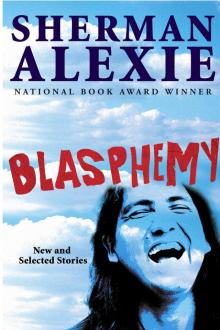 Blasphemy: New and Selected Stories
Blasphemy: New and Selected Stories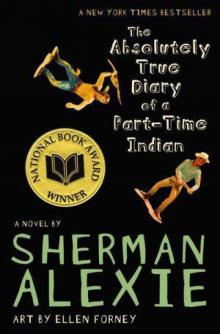 The Absolutely True Diary of a Part-Time Indian
The Absolutely True Diary of a Part-Time Indian Flight
Flight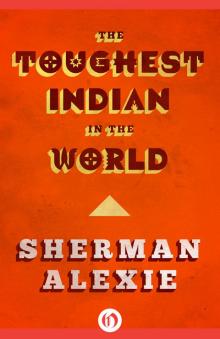 The Toughest Indian in the World: Stories
The Toughest Indian in the World: Stories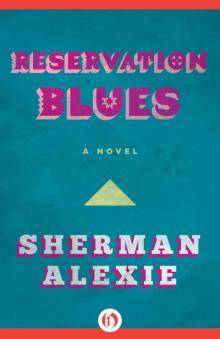 Reservation Blues
Reservation Blues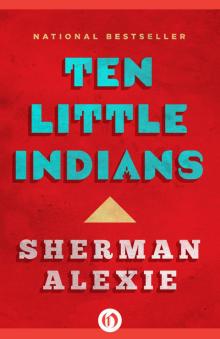 Ten Little Indians: Stories
Ten Little Indians: Stories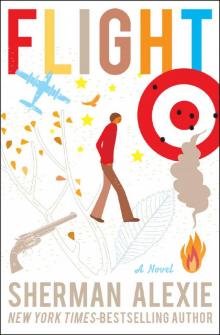 Flight: A Novel
Flight: A Novel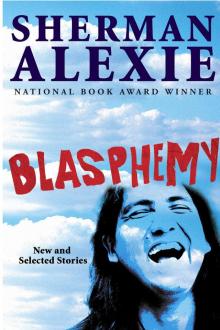 Blasphemy
Blasphemy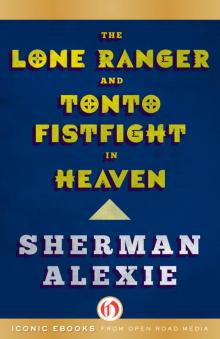 The Lone Ranger and Tonto Fistfight in Heaven
The Lone Ranger and Tonto Fistfight in Heaven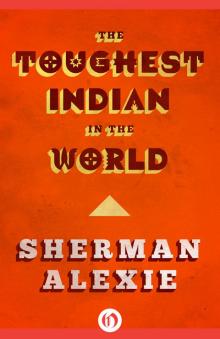 The Toughest Indian in the World
The Toughest Indian in the World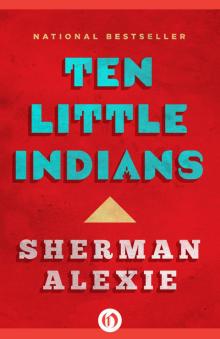 Ten Little Indians
Ten Little Indians